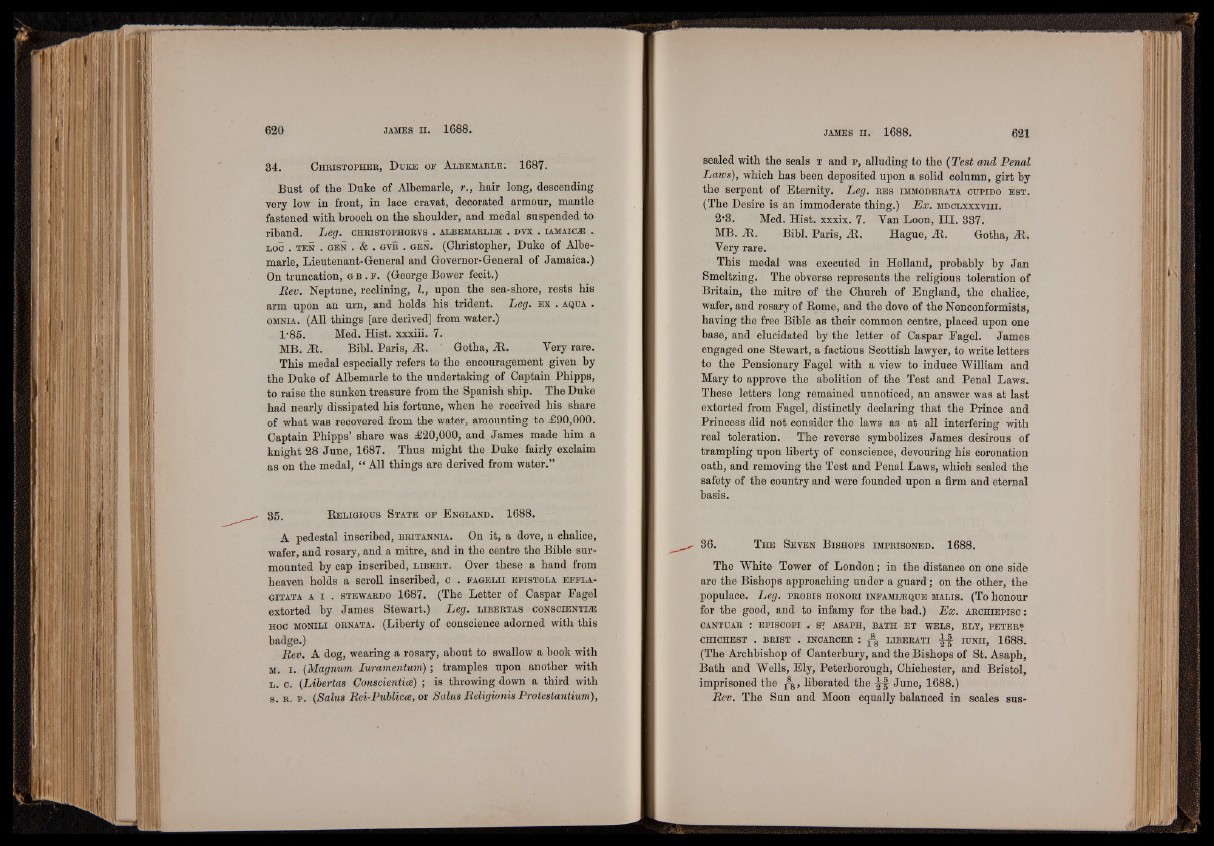
84. C h r is t o p h e r , D u k e o f A l b e m a r l e . 1687.
Bust of the Duke of Albemarle, r., hair long, descending
very low in front, in lace cravat, decorated armour, mantle
fastened with brooch on the shoulder, and medal suspended to
riband. Leg. c h r is t o ph o r v s . albem arliz e . dvx . iamaicze .
loo . t e n . g e n . & . gvb . g e n . (Christopher, Duke of Albemarle,
Lieutenant-General and Governor-General of Jamaica.)
On truncation, g b . f . (George Bower fecit.)
Rev. Neptune, reclining, I., upon the sea-shore, rests his
arm upon an urn, and holds his trident. Leg. e x . aqua .
om n ia . (All things [are derived] from water.)
1-85. Med. Hist, xxxiii. 7.
MB. At. Bibl. Paris, At. ' Gotha, At. Yery rare.
This medal especially refers to the encouragement given by
the Duke of Albemarle to the undertaking of Captain Phipps,
to raise the sunken treasure from the Spanish ship. The Duke
had nearly dissipated his fortune, when he received his share
of what was recovered from the water, amounting to £90,000.
Captain Phipps’ share was £20,000, and James made him a
knight 28 June, 1687. Thus might the Duke fairly exclaim
as on the medal, “ All things are derived from water.”
35. R e l i g i o u s S t a t e o f E n g l a n d . 1 6 8 8 .
A pedestal inscribed, Br it a n n ia . On it, a dove, a chalice,
wafer, and rosary, and a mitre, and in the centre the Bible surmounted
by cap inscribed, l ib e r t . Over these a hand from
heaven holds a scroll inscribed, c . f a g e l i i e p is t o l a e f f l a -
g it a t a a i . s t ew a r d o 1687. (The Letter of Caspar Fagel
extorted by James Stewart.) Leg. l ib e r t a s c o n s c ie n t l e
ho c m o n il i orna ta . (Liberty of conscience adorned with this
badge.)
Rev. A dog, wearing a rosary, about to swallow a book with
m . i. (Magnum Iuramentum); tramples upon another with
l . c. (Libertas Conscientice) ; is throwing down a third with
s. r . p . (Salus Rei-Publicce, or Salus Religionis Protestantium),
sealed with the seals t and p, alluding to the (Test and Penal
Laxos), which has been deposited upon a solid column, girt by
the serpent of Eternity. Leg. r e s im m o d era ta c u p id o e s t .
(The Desire is an immoderate thing.) Ex. m d c l x x x v iii.
2‘3. Med. Hist, xxxix. 7. Van Loon, III. 387.
MB. At. Bibl. Paris, At. Hague, At. Gotha, At.
Yery rare.
This medal was executed in Holland, probably by Jan
Smeltzing. The obverse represents the religious toleration of
Britain, the mitre of the Church of England, the chalice,
wafer, and rosary of Rome, and the dove of the Nonconformists,
having the free Bible as their common centre, placed upon one
base, and elucidated by the letter of Caspar Fagel. James
engaged one Stewart, a factious Scottish lawyer, to write letters
to the Pensionary Fagel with a view to induce William and
Mary to approve the abolition of the Test and Penal Laws.
These letters long remained unnoticed, an answer was at last
extorted from Fagel, distinctly declaring that the Prince and
Princess did not consider the laws as at all interfering with
real toleration. The reverse symbolizes James desirous of
trampling upon liberty of conscience, devouring his coronation
oath, and removing the Test and Penal Laws, which sealed the
safety of the country and were founded upon a firm and eternal
basis.
86. T h e S e v e n B is h o p s im p r is o n e d . 1688.
The White Tower of London; in the distance on one side
are the Bishops approaching under a guard; on the other, the
populace. Leg. p r o b is h o n o r i in fam iz eq u e m a l is . (T o honour
for the good, and to infamy for the bad.) Ex. a r o h ie p iso :
CANTUAR : EPISOOPI . ST ASAPH, BATH ET WELS, ELY, PETER®
CHI0HEST . BRIST . INCARCER : ^ LIBERATI j j f IUNII, 1688.
(The Archbishop of Canterbury, and the Bishops of St. Asaph,
Bath and Wells, Ely, Peterborough, Chichester, and Bristol,
imprisoned the liberated the June, 1688.)
Rev. The Sun and Moon equally balanced in scales sus